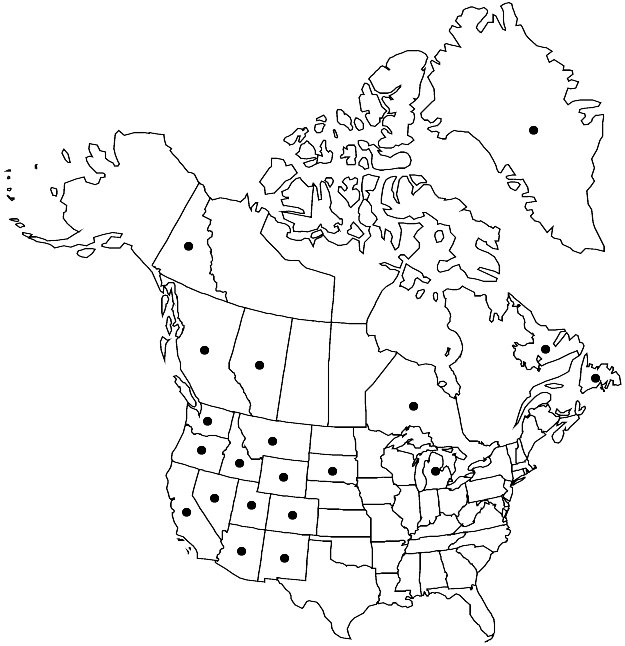Difference between revisions of "Orthotrichum alpestre"
Bryol. Europ. 3: 75, plate 213. 1849.
FNA>Volume Importer |
imported>Volume Importer |
||
| (3 intermediate revisions by 2 users not shown) | |||
| Line 11: | Line 11: | ||
|name=Orthotrichum alpestre var. majus | |name=Orthotrichum alpestre var. majus | ||
|authority=Lesquereux & James | |authority=Lesquereux & James | ||
| + | |rank=variety | ||
}} {{Treatment/ID/Synonym | }} {{Treatment/ID/Synonym | ||
|name=O. alpestre var. watsonii | |name=O. alpestre var. watsonii | ||
|authority=(James) Grout | |authority=(James) Grout | ||
| + | |rank=variety | ||
}} {{Treatment/ID/Synonym | }} {{Treatment/ID/Synonym | ||
|name=O. occidentale | |name=O. occidentale | ||
| − | |authority= | + | |authority= |
| + | |rank=species | ||
}} {{Treatment/ID/Synonym | }} {{Treatment/ID/Synonym | ||
|name=O. watsonii | |name=O. watsonii | ||
| − | |authority= | + | |authority= |
| + | |rank=species | ||
}} | }} | ||
|hierarchy=Orthotrichaceae;Orthotrichum;Orthotrichum alpestre | |hierarchy=Orthotrichaceae;Orthotrichum;Orthotrichum alpestre | ||
| Line 43: | Line 47: | ||
-->{{#Taxon: | -->{{#Taxon: | ||
name=Orthotrichum alpestre | name=Orthotrichum alpestre | ||
| − | |||
|authority=Hornschuch ex Bruch & Schimper | |authority=Hornschuch ex Bruch & Schimper | ||
|rank=species | |rank=species | ||
| Line 57: | Line 60: | ||
|publication year=1849 | |publication year=1849 | ||
|special status= | |special status= | ||
| − | |source xml=https:// | + | |source xml=https://bitbucket.org/aafc-mbb/fna-data-curation/src/2e0870ddd59836b60bcf96646a41e87ea5a5943a/coarse_grained_fna_xml/V28/V28_58.xml |
|genus=Orthotrichum | |genus=Orthotrichum | ||
|species=Orthotrichum alpestre | |species=Orthotrichum alpestre | ||
Latest revision as of 21:36, 5 November 2020
Plants 0.5–2.3 cm. Stem leaves loosely erect-appressed and ± loosely twisted when dry, elongate- to ovate-lanceolate, 2–3.5 mm; margins revolute to below apex, entire; apex sharply acute, sometimes acuminate, cuspidate, or apiculate; basal laminal cells long-rectangular to rectangular, walls thin, sometimes nodose at insertion; distal cells 9–14 µm, 1-stratose, papillae 2 or 3 per cell, conic or 2-fid, large. Specialized asexual reproduction on leaves. Sexual condition gonioautoicous. Seta to 1.4 mm. Capsule 1/2–3/4 emergent, sometimes almost exserted, oblong-ovate when mature, oblong to short-cylindric when old and dry, to 1.4 mm, strongly 8-ribbed 2/3 to entire length, constricted below mouth when dry; stomata immersed, 1/2 covered by subsidiary cells, cells projecting, inner walls thickened; peristome double; prostome absent; exostome teeth 8, reflexed, densely and evenly papillose, striate-reticulate distally; endostome segments 8 or 16, well developed, of 1 or 2 rows of cells, smooth or finely roughened. Calyptra oblong, smooth, ± hairy, hairs strongly papillose. Spores 10–15 µm.
Habitat: Rock, trees, base of trees, moist crevices of large boulders, moist pine and deciduous forests
Elevation: high elevations (2100-3000 m)
Distribution

Greenland, Alta., B.C., Nfld. and Labr., Ont., Yukon, Ariz., Calif., Colo., Idaho, Mich., Mont., Nev., N.Mex., Oreg., S.Dak., Utah, Wash., Wyo., Europe, Asia, Pacific Islands (New Zealand).
Discussion
Orthotrichum alpestre is distinguished by the highly papillose distal laminal cells; slightly twisted, sharply pointed leaves; calyptra with papillose hairs; absence of prostome; and papillose or papillose-reticulate exostome. The endostome is always present in mature capsules and, because of enlarged cross walls, has a shiny appearance. The capsule is usually oblong and strangulate, although the shape depends on age. In some specimens, the capsule is short-cylindric and not much constricted below the mouth. The stomata are found just below mid capsule.
Selected References
None.